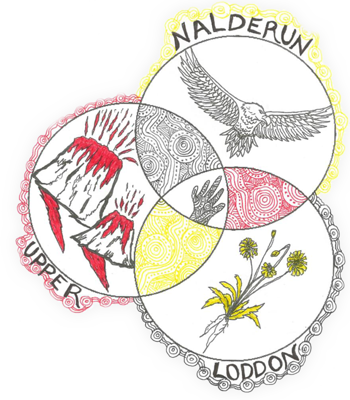
Anti Racist Resources for Teachers
About
Since the Voice to Parliament Referendum there has been a big increase in overt racism towards First Nations and Torres Strait islander peoples. This is having an especially devastating impact at this time when the community is reeling from the feeling of rejection by the overwhelming No vote within greater Australia. This has been significantly felt by First Nations children and youth in the playgrounds and classrooms at school where racism at home and in the media is coming through.
Teachers from Nalderun’s Network Group, from local primary and secondary schools, have been asking Nalderun for help. Teachers have been looking for support and resources to better respond to this increase of overt racism as well as the structural racism and inequity already present within the education system. Teachers want to help build cultures within classrooms and schools to help make First Nations students feel safe, valued and supported, so that First Nations students don’t have to take on this heavy burden themselves, and to co-create spaces where everyone can thrive.
Read this statement from Nalderun’s Directors from the leadup to the Referendum.
If you have any further suggestions, resources, or tips you would like to share we’d love to hear from you: info@nalderun.net.au
Nalderun’s Services:
Nalderun provide a range of trainings, consultations, tours and support within schools and beyond, tailored to the need of each context. For more details contact info@nalderun.net.au.
Nalderun also partner with Self Reflection Conversations Castlemaine to provide a conversation series run by and for non-Indigenous people to critically and personally reflect on allyship, structural racism, privilege and the dominant colonial culture. To find out about upcoming sessions or to book in a group contact: reflectionconversations@gmail.com
Anti-Racist and Allyship Resources
Here are some anti-racist resources for schools and beyond to get you started. We encourage people to do this work with others – find your peers or a community of practice to learn, grow and act together.
To work in allyship in addressing racism non-Indigenous people need to be engaging in three types of learning with curiosity and compassion. We believe learning is life-long and multi-generational:
- Learn about the histories and systems that shape the present. Listening to and amplifying the voices and truth telling of First Peoples.
- Learn through reflecting on your own sense of self – about the inherited culture, world view, biases, privileges, and racism.
- Learn through relationship – through respectful allyship and action supporting the self-determination, requests and leadership of First Peoples.
- The Anti-Racism Kit A Guide for High School Students: https://ca.hardiegrant.com/au/publishing/bookfinder/book/the-anti_racism-kit-by-jinyoung-kim/9781761211171
- The Burden on Blak students – talking about the Referendum in the Clas – Clothing The Gaps: https://www.clothingthegaps.com.au/blogs/blogs/the-burden-on-blak-students-talking-about-the-referendum-in-the-classroom
- Education and Reconciliation after the Referendum – Reconciliation Australia: https://www.reconciliation.org.au/education-and-reconciliation-after-the-referendum/
- Supporting Students following the Voice to Parliament Referendum. Department of Education Fact Sheet: https://www.education.vic.gov.au/Documents/school/Voice-to-Parliament-Information-for-Schools-factsheet.docx
- Narragunnawali – Take Action Against Racism: https://www.narragunnawali.org.au/rap/actions/30/take-action-against-racism
- Educational resources to teach children how to confront racism – ABC Education: https://www.abc.net.au/education/collections/the-school-that-tried-to-end-racism/educational-resources-to-teach-children-how-to-confront-racism/13550424
- The School That Tried To End Racism : ABC iview: https://iview.abc.net.au/show/school-that-tried-to-end-racism
- Getting racism out of the classroom | Pursuit by The University of Melbourne: https://pursuit.unimelb.edu.au/articles/getting-racism-out-of-the-classroom
- Racist bullying | vic.gov.au: https://www.vic.gov.au/racist-bullying
- Manungaboomboom Video_Uncle Rick Nelson’s story of Dja Dja Wurrung People and the impacts of colonisation on Dja Dja Wurrung County: https://vimeo.com/423429830
- Equal Opportunity and Human Rights – Students: Resources | education.vic.gov.au: https://www2.education.vic.gov.au/pal/equal-opportunity-human-rights-students/resources
- Bigger Than This – Anti-Racism Program Youth Working Group | Victorian Equal Opportunity and Human Rights Commission: https://www.humanrights.vic.gov.au/education/reducing-racism-hub/bigger-than-this/
- Racism in Schools – All Together Now: https://alltogethernow.org.au/racism/racism-in-schools/
- Australian Anti-Racism Kit: https://www.antiracismkit.com.au/#anchor
- Schools Standing Up To Racism – Centre For Multicultural Youth: https://www.cmy.net.au/schools-standing-up-to-racism/
- Racism. No Way: Anti-racism education for Australian schools: https://racismnoway.com.au/
- The Anti_Racism Kit: https://ca.hardiegrant.com/au/publishing/bookfinder/book/the-anti_racism-kit-by-jinyoung-kim/9781761211171
- ANTAR_Racism, let’s end it: https://antar.org.au/issues/racism/
- IndigenousX: https://indigenousx.com.au/
- A reflection by local non-Indigenous teacher Dino Cevolatti: https://reflectingonlearningandteaching.wordpress.com/2020/10/04/book-review-aboriginal-pedagogies-at-the-cultural-interface-phd-thesis-by-tyson-yunkaporta/

